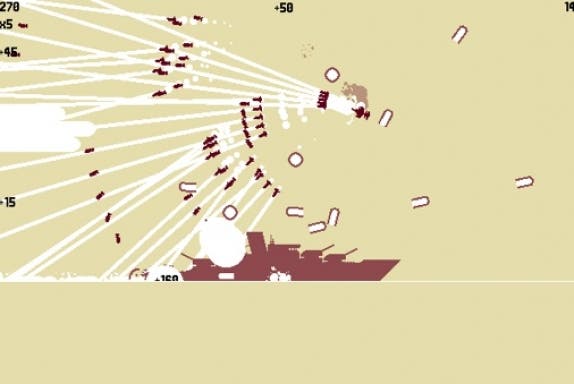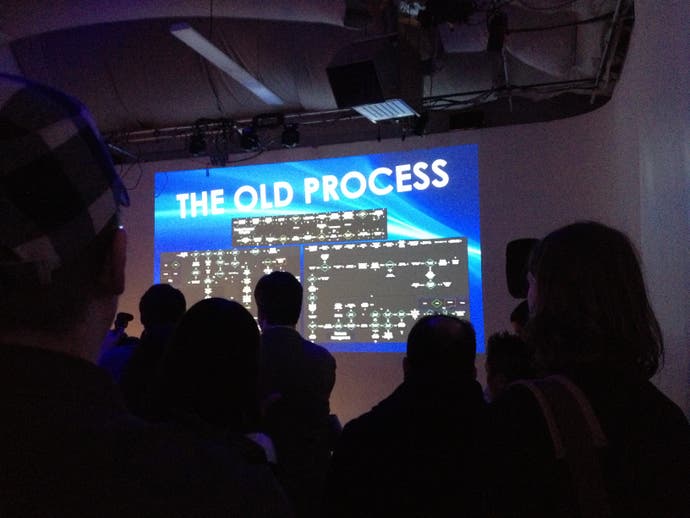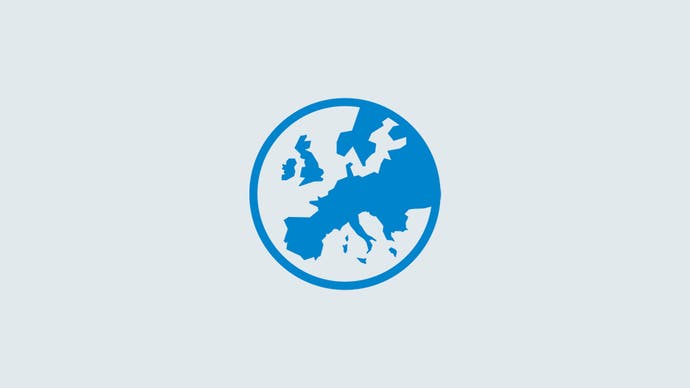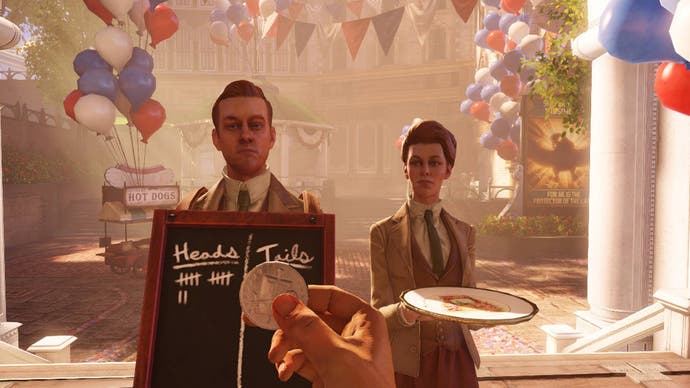Inside Sony's indie initiative: How the hardware giant is courting small-team talent
"It's not just about our policies, it's about our people."
The two-man developer Vlambeer knew it was on to something with its 2D dogfighting retro throwback Luftrausers. Its snappy pace and minimalist visuals seemed well suited for on-the-go gaming, but Vlambeer worried its control scheme would be compromised on mobile. Instead, the Netherlands-based developer decided it would be a perfect fit for the PlayStation Vita's widescreen and button input. So it did what any small studio would do - it worked on a pitch.
Before Vlambeer could send this out, Sony came to them.
Maybe this isn't that wild. The two had worked together before on Super Crate Box, after all, but it's indicative of a larger movement that Sony's been working towards, its goal to become the defacto hotspot for indie developers.
We've seen Sony creep towards this over the years with titles like Noby Noby Boy, Journey and Tokyo Jungle, but it's making much greater strides in this area with its fledgling handheld, the Vita, and the upcoming console behemoth, the PlayStation 4. The former is acquiring just about every PC indie hit under the sun with games like Hotline Miami, Lone Survivor, The Binding of Isaac, Thomas Was Alone, and Stealth Bastard making their way to the platform, while the latter had the outspoken indier-than-thou Braid developer Jonathan Blow front and center at the console's reveal event where he announced his upcoming game, The Witness, as a timed PS4-exclusive.
So why the strong push? Vlambeer's Rami Ismail thinks it's due to the astronomical success of Steam and the App Store. With games like Minecraft and Angry Birds dominating the market it's no wonder highly bestowed indie devs like Team Meat are gravitating towards mobile. It would seem that Sony realises that the marketplace is evolving and console manufacturers need to evolve with it, lest they go the way of the dodo.
"It feels like at this point Sony kind of gets the notion that they are not a necessity," says Ismail. "They are not a requirement for an indie developer to be successful. If Sony doesn't want to play ball, people can go to a number of other platforms and be successful on those. We can go to Steam, we can go to iOS, we can go to any of the other consoles that might be interested in talking. Nobody is a necessity at this point. Nobody is needed."
It's a dog eat dog world out there, so what's Sony doing to lure indies towards its end of the publishing pool? Quite a lot, as it turns out.
"It feels like at this point Sony kind of gets the notion that they are not a necessity."
Rami Ismail, Vlambeer

First and foremost, Sony is simplifying the process for independent developers to self-publish on both Vita and PS4. This simple matter was enough to lure Divekick developer Adam Heart to the Vita, even before Sony decided to bestow its Pub Fund safety net upon it (for the uninitiated, the Pub Fund is an advance against royalties, ensuring the developer gets a nice, fat paycheck independently of whether the game sells). "We went with Sony because they let us self publish," says Heart. "The pub fund agreement came later."
That's all well and good, but Steam also lets developers self-publish. As does Apple. As does Nintendo now on Wii U. What else has Sony got to give it that special edge?
According to SCEA VP of developer and publisher relations, Adam Boyes, the secret is simple: it listens to developers. "It's talking directly [to developers], it's listening to them, it's caring what they have to say, and then it's actually taking that feedback and applying it to improving things," explains Boyes at GDC. "A lot of times you sort of complain down an empty hallway and nobody's listening. So what we're doing this time is we're talking the talk, we're telling them that we're pro game, pro developer and then we're walking the walk. We're literally meeting on a weekly basis, changing and evolving all the processes. We're basically saying, 'what's bugging you most?'"
He also explains that the PS3 once had a 64-step submission process. A diagram of said process - below - resembles the labyrinthine map of Antichamber, and we all know how confounding that can be. "We're eliminating those literally on a weekly basis," he adds.
"It's talking directly [to developers], it's listening to them, it's caring what they have to say."
Adam Boyes, VP of developer and publisher relations, SCEA

Another example of Sony streamlining its submission process is consolidating its concept submission. "In the past you'd have to submit a concept submission once, and then we'd give a written review, and then developers would have to respond to each individual line, and then at concept submission two you wouldn't be able to submit until that got approved," Boyes reveals.
"And if there was feedback, you'd have to respond. It was a very rigorous process and when we talked to developers and basically asked them 'how helpful is this?' they said 'not very.' So we went internally and said 'let's make this one process.' It's [now] a checklist. The feedback is optional. So you just have to make sure you adhere to one of the platform pillars and then you're off."
When Boyes tells me this it sounds a bit bulls***ty. But Boyes knows it sounds bulls***ty. "We can talk until we're blue in the face and they might be like 'that's a cool story,' but without that story from other developers that are having that direct experience it's just getting into that echochamber," he admits.
So I decided to talk to these other developers and lo and behold, Sony has been meeting with indies regularly and of the ones I talked to, they all spoke positively of their collaboration.
"The contract and negotiations were done in like a week," says Ismail of his experiences getting Super Crate Box on Vita. "The terms were pretty mutually favourable. Everything was nice. [There was] no nitpicking, no talking about one single thing in the contract for weeks because they really want X and I don't want X, because X would mean I don't keep the rights to my game. There was none of that."
"We know it's common to say the collaboration was terrible, and I don't blame indie developers who say their collaborations are terrible, because a lot of collaborations are terrible, but our experiences with Sony - and our experiences pitching other indie games to them (and what we heard from our feedback) - was really, really positive," Ismail adds. "We're not ashamed to admit that this is a really good cooperation. It feels like an actual cooperation instead of somebody trying to sneak something out of a deal."
Vlambeer is also a fan of the Vita and notes that Nintendo was interested in getting it on 3DS, but Ismail says he "can't really see Luftrausers on 3DS, because the widescreen for the Vita is really, really, really perfect for Luftrausers. With 3DS it feels like we'd have to force it onto the platform in some way to make it fit the 3DS and that's not really what we do."
Ismail feels sorry that not everyone will get to play his game, but he explains that he got into development because he wanted to make "creative, new stuff," rather than deal with the business and technical burdens that come with porting already existing titles. "We're really sorry for the gamers that can't play our game, but we hope they understand that this is two guys making video games because they really want to be making video games." On the plus side for non-Vita owners, Vlambeer has made 16 games in roughly two years, so if you miss a release or two of theirs, there's probably another one right behind it for a platform you do own.
"When we were talking to groups with PlayStation 3 they wanted games like Flower and if I were to have come to them with a game like Blacklight they would have gone, 'no, this isn't indie enough for us. We want something that's quirky and different.'"
Jared Gerritzen, Zombie Studios

On the opposite end of the spectrum is Zombie Studios' free-to-play first-person shooter Blacklight: Retribution, which is heading to the PS4. Not only is Blacklight a dark, gritty FPS, but studio head Jared Gerritzen has the exact opposite approach to game development than Vlambeer, where he likes spending ages on one game, consistently improving upon the same foundation.
"When we were first talking about free-to-play we were thinking of all these Asian games making a bunch of money. We were like 'wow there's this untapped market.' But the thing that excites me about free-to-play is you have to make new DLC. We made new content for free for a year."
And yet, Sony's new approach has room for the Seattle-based studio's more mainstream offering. "When we were talking to groups with PlayStation 3 they wanted games like Flower and if I were to have come to them with a game like Blacklight they would have gone, 'no, this isn't indie enough for us. We want something that's quirky and different," says Gerritzen. "A game that has the primary function of jumping and shooting and killing in a first-person world is definitely not what you would expect to see when someone says we're an indie game. It's really cool to see that they're expanding what indie is in their heads."
Not only is Sony putting Blacklight onto its highly anticipated platform, it's putting some of its own cash into it via the Indie Pub Fund, though Gerritzen explained that it's only covering the licensing costs for Unreal Engine 3. How did a game like Blacklight get selected to join such bold projects like Papo & Yo and Tales From Space: About a Blob, you ask?
Gerritzen told me a story about how he was invited to a dinner for indie developers at E3 and a friend at Sony introduced him to some Pub Fund organisers who were keen to use Blacklight to expand its portfolio. "I think they wanted to prove that it's not just games like Journey and Flower and Fez, but it's also games that could be called a triple-A shooter," hypothesises Gerritzen. "They had an experience with us previously and they knew that we'd be able to get it out. The crux of it is they were able to touch it and feel it and they liked it. Some of the guys were fans of it."
It's not just Sony making this push towards indies as Nintendo is now allowing self-publishing on Wii U, but Sony seems to be pursuing its indie initiative the quickest. When asked about the competition, Gerritzen declined to comment, but he did say that Sony is "definitely moving the fastest. They definitely want to prove themselves the most. All you have to do is look at what's happening right now and they are running hot."

This speed was crucial in securing Indie Pub Fund title and Vita-exclusive Metrico, which developer Digital Dreams says Nintendo was interested in too. Artist Geert Nellen notes that Nintendo "was a bit slow" in getting back to the three-person Netherlands-based studio and by the time it made an offer (or almost made an offer as the two companies were still negotiating terms) Sony had made a better offer with the Pub Fund arrangement that would help Digital Dreams finance its marketing.
Similarly, Nellen says he pitched Metrico to Microsoft over a year and a half ago, but the Xbox 360 publisher dragged its heels and eventually flaked out. "Microsoft was interested and we got to speak to one of the producers of Xbox Live Arcade," explains Nellen. "We were like 'Wow! This is the first pitch we've done and it went really well and they're enthusiastic.' And we met them again and this guy said 'maybe we can even do a little funding to get you to make a better prototype so we can get you a better offer,' and we were all really excited. But after that it was just hard to get a hold of them.
"It was very disappointing, especially at that point because Xbox Live Arcade was still where the big indie games came out. It's not like that anymore."
Comparatively, Sony's developer relations team has been positively gung-ho about scoping out talent. "The interesting thing about what Sony has been doing is they have this really small sort of indie team just looking for indie games," says Ismail. "It's super helpful what they're doing. They're actually reaching out instead of being a closed wall or guarded thing... and these people are all friendly."
I decided to seek out these so-called friendly people to find out more about its scouting and supporting process. Account support manager of developer relations Nick Suttner explains: "Our entire team at SCEA is less than 10 people, with about three of us doing the 'scouring' as part of our day to day, both at a variety of industry events as well as online."
"It's not about what we're looking for, it's about the game they really want to make... It's about delivering on an authorial vision."
Nick Suttner, account support manager of developer relations, SCEA

When asked what Sony looks for in a game, Suttner responds: "Developers often ask us this too (in a very general sense), and we always tell them that it's not about what we're looking for, it's about the game they really want to make... It's about delivering on an authorial vision, and for our part, helping the game to find its audience on PlayStation Network."
This hands-off approach is equally valued in Sony Europe as well. "We have a really simple motto: 'support, steer, don't interfere,'" says SCEE's senior business development manager Shahid Ahmad. "If you're working with the likes of Vlambeer, what are you going to teach them about how to make a game?"
"We like to engage with developers who have a certain degree of authenticity in their work, who are passionate about their work, for whom there's nothing else they'd rather be doing in the whole world," Ahmad explains. "This is not a job to them. This is their life. And so they're absolutely committed to making their creativity work."
"This is very, very different from going out and commissioning games in a traditional way," adds VP of networked products planning and development Nainan Shah. "This is not about going and looking over their shoulder to check whether they're doing the right thing. This is about finding the talent and enabling that talent to do what they want."
Ahmad likens Sony's relationship to indie devs as that of "long lost twins finally meeting each other and really liking each other, not quite being aware of the other's existence."
"For example, I had a conversation with Mike Bithell, the author of Thomas Was Alone," Ahmad continues. "I was a fan. And when he found out PlayStation was interested in the work he was doing, he was quite surprised. And I was surprised that he was surprised."
Sony might not hover over its indie devs, but it seems glad to offer its support. Shaw explains Sony is willing to send indies dev kits, sometimes offers funding, and pairs teams up with experienced console developers in order to help first timers ease their way into console development.
There is one other benefit Sony has over its mobile and computer counterparts: the Vita is a dedicated gaming platform. People may play Angry Birds on their phone while killing time waiting for a train or mess around with Minecraft on their work computer, but the Vita is focused on a passionate audience that cares about gaming as a medium. "The attraction for them [devs] is they can now attract people who really, really want to game, and they want to game in a dedicated, meaningful way," adds Shah. "They have many choices. They've got Android, they've got Steam, but they've never had a dedicated game console in the portable space to choose from until PSP and now Vita."
Ultimately, these business decisions come down to the human element. Sony may be a corporation, but it's a corporation of individuals and these personal relationships should not be underestimated.
"Support, steer, don't interfere."
Shahid Ahmad, senior business development manager, SCEE

"It's not just about our policies, it's about our people," says Suttner. "A more open platform is nice, but you really need an accessible, passionate Developer Relations team to avoid it feeling like you're dealing with a monolithic entity."
According to Gerritzen, the whole of Sony seems to be on board. "Their upper management - so not only just the biz dev guys and their boss, but like their higher upper management - have all been really excited about what's going on," says Gerritzen. "They really truly believe that this is the next step. It's not like two guys are dragging the biz dev guys. It's literally a full group. It's a full effort and it's really refreshing."
Ismail echoes this sentiment and explains that Sony has really gone out of its way to make him feel valued, such as when it swung him an 11th hour pass to the PS4 reveal event earlier this year after he missed a flight. "I was invited to the PlayStation 4 event in New York because I missed my flight out of New York that day, so they actually arranged a last minute invite for me," he recalls. "After that Nick [Suttner] and Zach Gage and Douglas Wilson and some others went to Zach's house and played Spelunky on an Xbox... with the PlayStation guys."
"It's easy to assume for a lot of people that these companies are companies, and that they act and behave as companies," says Ismail. "But in the end it's always a person talking to a person. A human being talking to a human being. And the way people interact and that sense of trust and value that they instill in each other is so important to what actually happens, to what games come to what platform.
"Having people that understand or value games and creation as much as the people that they have to work with is...[Ismail interrupts himself] I don't understand why that is not an industry standard. I think Sony is doing this really well."
It would appear that Boyes wasn't full of it, then. Sony talked the talk about meeting, listening to, and being chummy with developers, and after speaking with several of them it's clear that the company has in fact been walking the walk as well. It's just that in this case, walking is talking.

